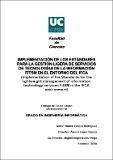Por favor, use este identificador para citar o enlazar a este item:
http://hdl.handle.net/10261/172680COMPARTIR / EXPORTAR:
 SHARE
BASE SHARE
BASE
|
|
| Visualizar otros formatos: MARC | Dublin Core | RDF | ORE | MODS | METS | DIDL | DATACITE | |

| Título: | Implementación de los estándares para la gestión ligera de servicios de tecnologías de la información FitSM en el entorno del IFCA |
Otros títulos: | Implementation of the standards for the lightweight management of information technology services FitSM in the IFCA environment | Autor: | Cotera Rodríguez, Rubén | Director: | López García, Álvaro CSIC ORCID; Núñez Vega, Miguel Ángel | Palabras clave: | CPD Centro de datos Centro de procesamiento de datos Gestión de servicios de TI FitSM SLA Data processing center Datacenter IT service management |
Fecha de publicación: | 2018 | Editor: | Universidad de Cantabria | Resumen: | [ES]: En el presente proyecto se explica el modo en que se ha llevado a cabo la implementación del framework FitSM en el centro de datos del IFCA. La gestión de centros de procesamiento de datos es un proceso complejo y, por lo tanto, requiere de una estandarización. Mediante la estandarización se consigue tres cosas principalmente: optimizar los esfuerzos del personal, mejorar la calidad del servicio, y garantizar el cumplimiento mínimo del servicio exigido por los clientes. FitSM es un estándar ligero sencillo de entender e implementar. Es compatible con el estándar ITIL, el más extendido de la categoría, y con la ISO/IEC 20000. Sin embargo, éstos dos estándares son largos y complejos, más adecuados a CPDs de gran tamaño con cientos o miles de clientes. En el caso del IFCA tenemos un CPD de pequeño tamaño, que da servicio a unas decenas de clientes, por lo que un estándar más simple de aplicar, pero escalable para el futuro, como FitSM es más adecuado. La aplicación de un estándar es un proceso largo y que implica a muchas personas y equipos que deben trabajar juntos. Por ello éste trabajo se ha centrado principalmente en la parte del soporte técnico, ya que se considera el punto de contacto con el cliente más importante. Un servicio medio o normal con un buen soporte siempre llevará mejor valoración que un servicio excepcional que no responde cuando el cliente tiene un problema. [EN]: In this project is explained the way that the framework FitSM has been implemented and deployed in the IFCA data center. The management of a data processing center is a complex process and requires an standardization. With the standardization, three goals are covered: optimize the effort of the staff, improve the quality of service, and warranty the minimum compliance asked by the clients. FitSM is a lightweight standard easy to understand and implement. It is compatible with the standard ITIL, the most extended in the category, and with the ISO/IEC 20000. However, this other two standards are long and complex, better for big Data Processing Centers, with hundreds or thousands of clients. The IFCA has a DPC small, which serves dozens of clients. For this reason is better to apply an standard like FitSM, easier to implement, but scalable for the future. The application of an standard is a long and complex project which involves a lot of people and teams working together. For this reason, this work has been focused in the technical support area. Because this is considered the most important point of contact with the client. A service medium with a good support is always better ratted than other one exceptional wich not respond correctly when the client has a problem. |
Descripción: | Trabajo de Fin de Grado para acceder al Grado en Ingeniería Informática. | URI: | http://hdl.handle.net/10261/172680 |
| Aparece en las colecciones: | (IFCA) Tesis |
Ficheros en este ítem:
| Fichero | Descripción | Tamaño | Formato | |
|---|---|---|---|---|
| implementorIFCA.pdf | 1,32 MB | Adobe PDF |  Visualizar/Abrir |
CORE Recommender
Page view(s)
394
checked on 19-abr-2024
Download(s)
1.152
checked on 19-abr-2024
Google ScholarTM
Check
Este item está licenciado bajo una Licencia Creative Commons

